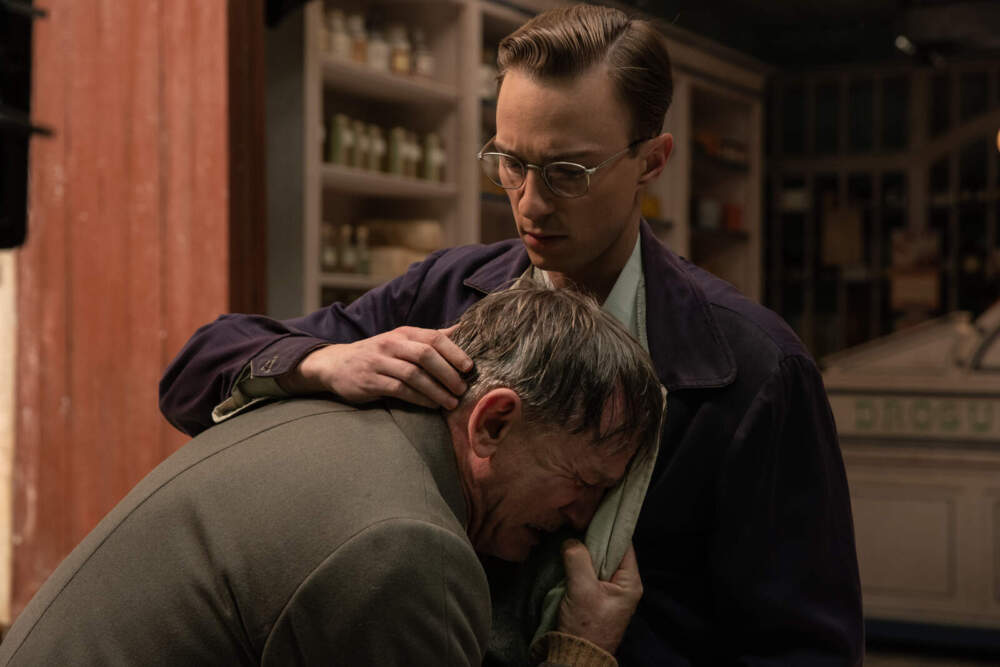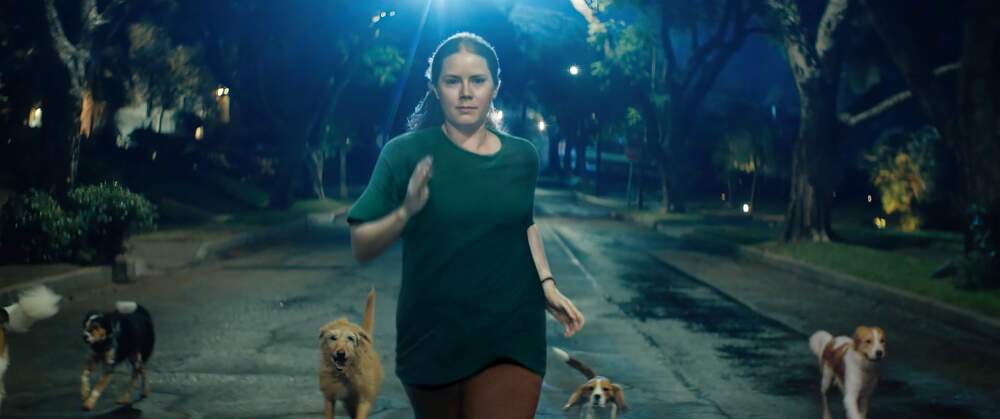Advertisement
Review
Film adaptations of 'Queer' and 'Nightbitch' fall short

When it comes to movie adaptations of popular novels, people like to tell you that the book is always better. This is an argument that reading “Jaws” or “The Godfather” can quickly put an end to, but I will concede that the book is usually better. Novels aren’t screenplays, and often what’s compelling on the page doesn’t translate to the screen. Such is the case with two new releases, director Marielle Heller’s troubled take on Amy Yoder’s controversial 2021 novel “Nightbitch,” and Luca Guadagnino’s buzzy adaptation of Beat legend William S. Burroughs’ second book, “Queer.”
Do young people still read the Beats, or is it all just dragons and dystopias now? Burroughs had a big resurgence when I was a teenager, thanks to his appearance in Gus Van Sant’s “Drugstore Cowboy” and friendship with fellow opioid enthusiast Kurt Cobain. I remember buying their collaboration “The ‘Priest’ They Called Him,” a limited edition LP on which Burroughs read “The Junky’s Christmas” in his creaky warble while Kurt wailed a feedback-laden “Silent Night” on the guitar. (Wish I knew what I did with it, as nowadays that record could probably pay my rent.) A high school English teacher once contacted my parents, concerned because I was reading Burroughs’ “Naked Lunch.” But by then, my folks had become accustomed to such calls, which had been coming to the house with some regularity since fifth grade, when I did an oral book report on Kurt Vonnegut’s “Slaughterhouse-Five.” Anyway, I turned out fine.

Though penned nearly 40 years prior, Burroughs’ pitilessly unsentimental phantasmagorias about addicts, hustlers and dope-sick street preachers were perfectly suited to the early ‘90s grunge sensibility. (I still have a 1995 paperback omnibus of his first three books with cover art that looks like an Alice in Chains album.) “Queer” was written in the ‘50s but remained unpublished until 1985, for reasons that are probably obvious from the title. It’s an intentionally frustrating work, following the author’s regular alter ego William Lee during a period of exile in Mexico City, where he’s trying to stay off smack by wallowing in drunken promiscuity. Lee becomes fixated on a much younger, prettier boy named Allerton, acquiring the hunk’s attention — if not his affection — via much unseemly pleading and a few financial incentives. The two travel together to Ecuador in search of ayahuasca, a quest that, like everything else in the book, comes to naught.
It's tough to think of an odder match for the cold, dyspeptic Burroughs than Luca Guadagnino, the lush Italian sensualist behind “A Bigger Splash,” “Call Me by Your Name” and this past spring’s “Challengers.” “Queer” carries over most of the creative crew from that sexy tennis saga, including screenwriter Justin Kuritzkes, cinematographer Sayombhu Mukdeeprom and composers Trent Reznor and Atticus Ross, none of them really working in their wheelhouses here. Adding to the sense of ill-fitting dislocation is Daniel Craig as Lee, treating every scene as a limp-wristed, flop-sweat burlesque. The actor deserves kudos for trying to get back to the sexually adventurous, pre-007 roles he played in films like Roger Michell’s “The Mother” and the Francis Bacon biopic “Love is the Devil,” but he’s all wrong for Burroughs, with aloof observer Lee mincing around like he’s Benoit Blanc’s socially awkward cousin. One also might wonder why this cadaverous junkie has the body of an Olympian.
Guadagnino leans hard on the Cobain connection, opening with Sinéad O’Connor’s cover of “All Apologies” and blasting Nirvana’s “Come as You Are” on the soundtrack when Lee first sees Allerton. No matter that the movie is set in 1949, Lee listens to New Order while he’s shooting up, and Prince’s “Musicology” is played for reasons I still don’t understand. Anachronistic music cues can offer neat authorial counterpoints — Sofia Coppola’s films are full of them — but Guadagnino doesn’t seem to have thought these songs through. They’re shallow stylistic affectations, similar to the way he photographs Burroughs’ trademark pistol and fedora as if they were Lee’s superhero costume, fashionable accessories like the cool “Queer” tote bag I received from distributor A24.

The film includes allusions to the author’s accidental shooting of his second wife Joan Vollmer, but doesn’t reckon with it in any real way. It’s there for the same reason as the Cobain songs and the bugs from “Naked Lunch” that turn up from time to time. These are things that people associate with William S. Burroughs, so I suppose they’ve got to be in the movie somewhere.
The best performance comes from Jason Schwartzman as a friend of Lee’s, obviously modeled on Allen Ginsberg. Heavy set and wearing a big, bushy beard, the actor more closely resembles his uncle, Francis Ford Coppola, and he’s the only person onscreen who doesn’t get trampled beneath Craig’s showboating. As Allerton, the obscure object of Lee’s desire, Drew Starkey is an attractive blank, which I suppose suits an idealized abstraction of a character, but it’s tough spending 135 minutes watching someone pine for this pill. The movie feels like it goes on forever.
Unlike in Burroughs’ book, the film’s characters eventually do manage to locate their elusive mystery drug out there in the jungle, and that's when “Queer” goes from merely lousy to actively embarrassing. Guadagnino indulges in all sorts of freaky-deaky flourishes out of ‘60s acid trip movies, with body horror asides that play like bad Cronenberg karaoke. (The Canadian filmmaker’s masterful 1991 adaptation of “Naked Lunch” is not a comparison any smart director should be inviting.) Even worse is a mawkish epilogue modeled on the hotel room at the end of “2001: A Space Odyssey,” which commits a sin far grosser than any acts of degradation in Burroughs’ most outré novels: it makes him sentimental and bathetic.
Advertisement

“Nightbitch” is a literary conceit in search of a visual analogue. The film stars Amy Adams as a stay-at-home mom who walked away from a fulfilling career in the arts and now finds herself having a bit of buyer’s remorse about what was supposed to be her perfect suburban life. Her husband (Scoot McNairy) is away during the week on business, leaving the apparently friendless mother alone with their toddler. Slowly losing her mind from the lack of adult contact, she comes to believe she’s turning into a dog — noticing strange patches of hair on her body and protruding canine teeth, with occasional bouts of territorial aggression. Sometimes she barks at strangers.
You can tell from the fact that the characters don’t have names and are billed as “Mother” and “Father” that “Nightbitch” is trying for some sort of universality thing, but Heller’s insufficiently stylized direction can’t bear the metaphorical weight. It looks like a cable show. She’s a terribly pleasant filmmaker, as evidenced by her previous picture, “A Beautiful Day in the Neighborhood,” which wasted a terrific Tom Hanks performance as Mr. Rogers on the amazingly uninteresting story of a sad sack journalist making peace with his sick dad. Heller’s first film, “The Diary of a Teenage Girl” soft-soaped some tough topics, and “Nightbitch” also plays things way too safe for its own good, coming close to a couple of uncomfortable realities before sheepishly backing away. She barks, but the movie has no bite.
Adams is an enormously likable lead. Probably too likable for a film that wants to strip away happy homemaker illusions about motherhood and present it as something more frightening and feral. It’s commendable that she actually lets herself look like a regular person in the role — gossip sites were horrid about her appearance during the shoot — but you watch “Nightbitch” with a nagging suspicion that something’s been sanded down here. Out of curiosity, I picked up Yoder’s book from my local library and sure enough, there in her serrated, compulsively readable prose was the angry energy missing from the movie, written in seething language worthy of the title. Pardon my misgendered metaphor, but the film feels like it’s been neutered.
“Queer” and “Nightbitch” are now in theaters.
